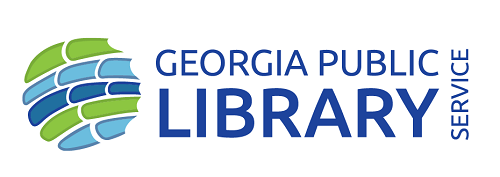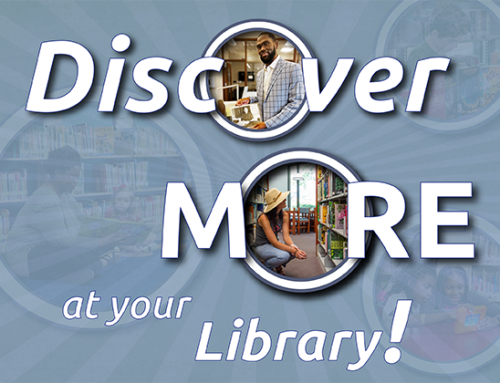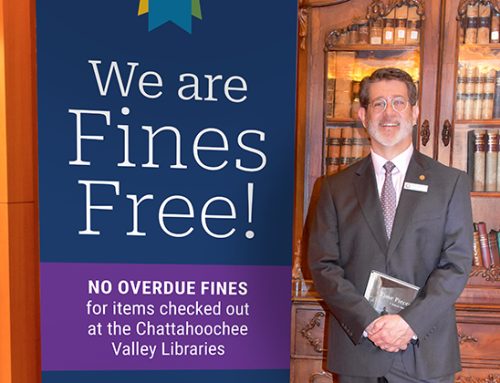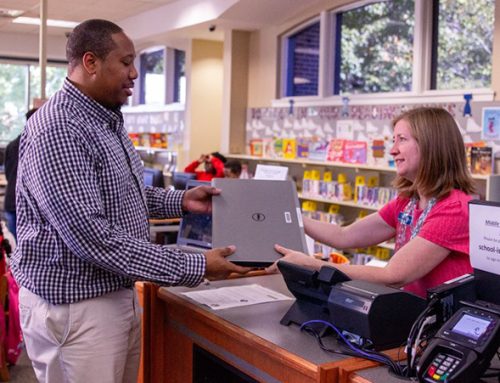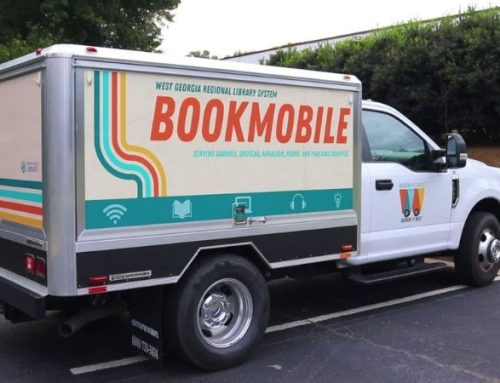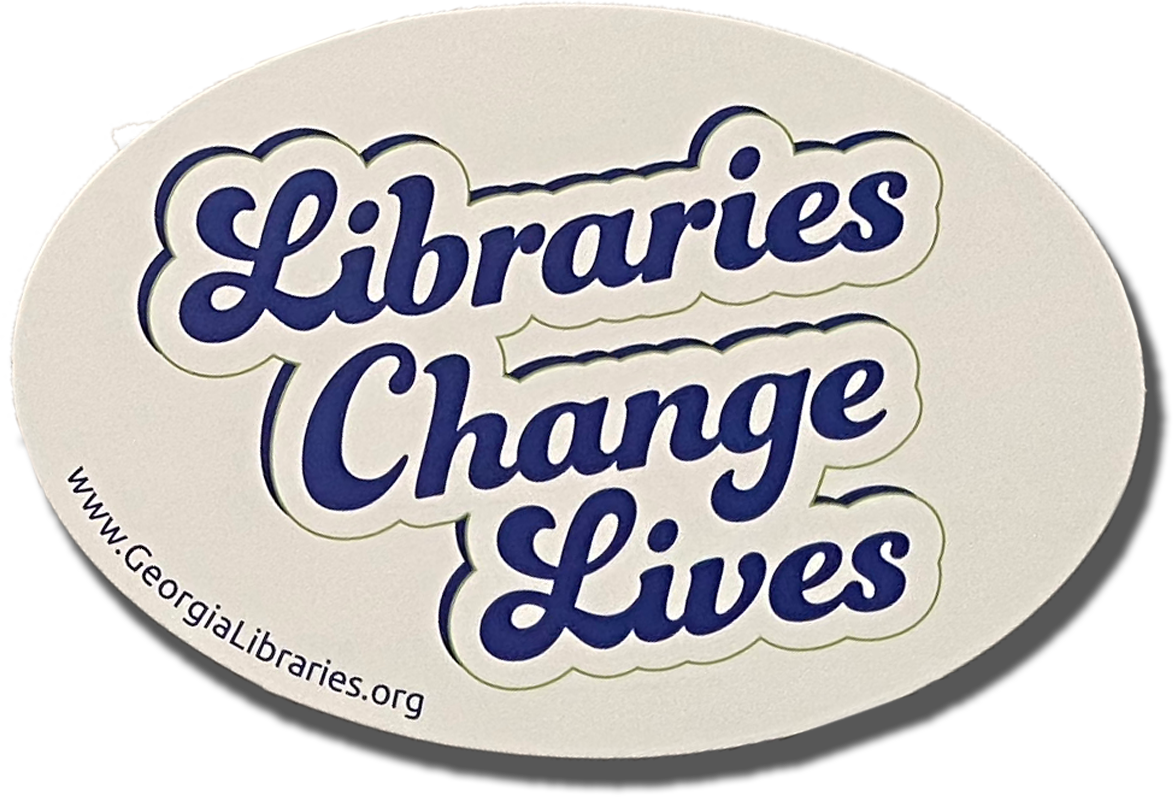During the COVID-19 pandemic, the PINES Library Access for Youth (PLAY) card provided vital access to digital resources for students who couldn’t utilize them through their school during closures.

Two Walker County School students visit the Rossville Public Library to check out books with their PLAY cards. The library is a part of the Cherokee Regional Library System. Chelsea Kovalevskiy, the system’s assistant director, believes PLAY can encourage students to become lifelong library users.
“The first year saw a great spike in interest as libraries and schools were trying to fill any gaps in access that the COVID-19 closures caused,” said Susan Morrison, operations analyst at PINES, who manages the rollout of the PLAY program between school and public library systems.
In a post-pandemic world, PLAY has grown steadily to provide nearly half a million pre-K to 12th grade students in 41 school districts the ability to check out books without late fees, request items at any PINES library to be delivered to their local library, and use online reading and learning programs like eRead Kids, LearningExpress Library, and Mango Languages.
PLAY was developed by Georgia Public Library Service to give more youths access to their local public library and the tools they need to build literacy skills. It’s a statewide initiative, but individual libraries and school systems forge local agreements for how to implement the PLAY card in their community. While virtual and distance learning have become less common, PLAY’s ability to provide students with more learning resources is still playing an essential role in many students’ education.
Teachers are using the program to bridge the gap when their schools do not have certain books or materials.
Robin Samples, director of curriculum and instruction at Walker County Schools, said, “If they’re teaching a particular standard, if there’s a small element of the standard that we don’t have the resources for, now with that ‘unlimited library’ they’re able to find a resource through the public library for pretty much every area of the curriculum that they teach.”
Walker County Schools partners with Cherokee Regional Library System for PLAY. “Teachers have really appreciated the increase in teaching materials, and PLAY continues to be used in more classrooms throughout the district,” said Samples.

The benefits extend beyond the classroom. Rita Harris, director of community engagement for Live Oak Public Libraries, has witnessed firsthand how PLAY reduces barriers to library usage, such as eliminating late fees so students can check out books worry-free.
“A parent came into Forest City Library with her four children. She wanted to get library cards for them, but she had late fees on her account,” said Harris. “The library explained that her children could check out items fines free with their student PLAY accounts. The children were all so excited to be able to check out books again.”
Christine Bartlan has made PLAY a part of her children’s and students’ learning experience.
“PLAY has been very beneficial to my kindergarten classroom,” she said. “The school does not have a library on campus, and we are very thankful to have a PINES library close by. Students have such joy being independent and checking out their own books,” said Bartlan.
When school and public library systems agree to partner for the program, they encourage students to use their PLAY cards in the classroom, at the library, and at home.
“We’ve taught kids how to check out books from eRead Kids on their school Chromebooks, how to access Mango Languages and LearningExpress Library, and more,” said Chelsea Kovalevskiy, assistant director of Cherokee Regional Library System. “While our schools have always appreciated what the public library offers their students, that value has been diminished by the difficulty in accessing it. PLAY enables us to make more easily accessible what we’ve always brought to the table, increasing its value exponentially.”
Public library staff connect with families by attending school events like open houses, school registration events, PTA meetings, and other local community events.
“We are able to visit the schools more often, provide more value to the students, and in turn the school system has a better understanding of how their students use the library,” said Kovalevskiy.

As part of a recent marketing campaign, the Azalea Regional Library System provided students across six school districts with physical PLAY cards and visited classrooms to share benefits of using it.
The Azalea Regional Library System began its local PLAY card program in 2020. They currently partner with six school districts, with another joining in October 2023. Once that onboarding process is complete, every public school system within the library system’s service area will have access. The system recently ran a marketing campaign to promote awareness and usage of PLAY, which was funded through a Georgia Public Library Service grant.
To give students a tangible way to remember to use library resources, physical PLAY cards were designed and disseminated to elementary, middle, and high schools. PLAY cards are traditionally offered solely in digital format. During classroom visits, library staff guided students through the sign-up process for Hoopla and Libby, streaming and music platforms, and showcased the wide range of content available for educational endeavors and personal enjoyment.
Library staff also engaged with their communities at programs and events to raise awareness about the PLAY card and its benefits. Outreach activities allowed them to interact with residents, initiating conversations about the PLAY card and encouraging its usage.
“The success of such a program depends on effective communication, a clear understanding of roles, and a shared commitment to enriching students’ lives through educational experiences,” said Stacy Brown, executive director of Azalea Regional Library System. “Our library system provides valuable resources and learning opportunities to students, and schools support the PLAY student card program by promoting it to students, parents, and staff.”
The program is a great way to strengthen relationships between public libraries and the schools and communities they serve.
“Georgia’s public libraries do so much to support their communities, and I think being able to experience all that the library has to offer is so important at a young age,” said Morrison.
She is excited about the increase in access to public library resources and services for students, as well as the efforts to improve the program and expand PLAY to more students.
“We are continuously evaluating our process to grow the program with public schools and also seeing how we can offer these same benefits to as many students as possible, including students who attend private or virtual schools,” said Morrison.

“I love to use my PLAY card; I learned about it from the library,” said Auriel from Loganville.
With PLAY, students can check out books from the public library with their own account.
PLAY is expanding to more schools across the state this fall, including Lowndes County, Lanier County, Valdosta City, Toombs County, and Putnam County. Reach out to your child’s school or public library to find out if PLAY is available.
